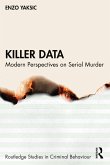Killer Data examines the phenomenon of serial murder using data collected from international sources to review offender patterning with a focus on contemporary cases. This type of attention will allow for a broader understanding of modern-day serial murderers and will help to dispel some of the myths that surround offenders.
The current serial murder classification scheme incorrectly types serial murderers as supremely intelligent killing machines while discounting their socialization, experiences, and choices. This book exposes serial murderers as run-of-the-mill hometown losers, who brutalize women, and are lucky to escape apprehension. Like other atypical homicide offenders, modern-day serial murderers are propelled forward by a deep sense of entitlement, easy access to firearms, and a nonchalant attitude toward using murder to attain their goals. Readers should come away with a deeper understanding not of the ultra-rare or the "deadliest" serial murderers but of the morecommon offenders who pose a consistent threat to day-to-day life. The book utilizes the Consolidated Serial Homicide Offender Database, one of the largest and most robust open access databases of multiple murders available, presenting new thinking on areas such as:
myths and stereotypesthe impact of entertainment on the perception of serial murderinaccurate prevalence estimatesspree/serial hybrid offendersthe classification of two and three victim serial murderershow serial murderers pursue longevitythe characteristics of aspiring serial murdererswhether hit men and gang members are serial murderersif and why serial murder is in a state of declinehow many serial murderers are responsible for the homicides that sent innocent people to prisonluck as a factor of "success" for serial murderers.
These findings are illustrated with 200 narrative vignettes of serial murder series that occurred between 2011 and 2021, such as Itzcoatl Ocampo, Charles Severance, Nikko Jenkins, and Pamela Hupp, offenders who may be unfamiliar to many but represent the next iteration of the serial murderer.
Correcting decades of flawed assumptions about serial murderers, and written in an accessible and concise style, Killer Data is essential reading for students and scholars of criminal justice and criminology, law enforcement professionals, and the interested general reader.
The current serial murder classification scheme incorrectly types serial murderers as supremely intelligent killing machines while discounting their socialization, experiences, and choices. This book exposes serial murderers as run-of-the-mill hometown losers, who brutalize women, and are lucky to escape apprehension. Like other atypical homicide offenders, modern-day serial murderers are propelled forward by a deep sense of entitlement, easy access to firearms, and a nonchalant attitude toward using murder to attain their goals. Readers should come away with a deeper understanding not of the ultra-rare or the "deadliest" serial murderers but of the morecommon offenders who pose a consistent threat to day-to-day life. The book utilizes the Consolidated Serial Homicide Offender Database, one of the largest and most robust open access databases of multiple murders available, presenting new thinking on areas such as:
myths and stereotypesthe impact of entertainment on the perception of serial murderinaccurate prevalence estimatesspree/serial hybrid offendersthe classification of two and three victim serial murderershow serial murderers pursue longevitythe characteristics of aspiring serial murdererswhether hit men and gang members are serial murderersif and why serial murder is in a state of declinehow many serial murderers are responsible for the homicides that sent innocent people to prisonluck as a factor of "success" for serial murderers.
These findings are illustrated with 200 narrative vignettes of serial murder series that occurred between 2011 and 2021, such as Itzcoatl Ocampo, Charles Severance, Nikko Jenkins, and Pamela Hupp, offenders who may be unfamiliar to many but represent the next iteration of the serial murderer.
Correcting decades of flawed assumptions about serial murderers, and written in an accessible and concise style, Killer Data is essential reading for students and scholars of criminal justice and criminology, law enforcement professionals, and the interested general reader.
"As a researcher of serial murder, I am all too familiar that many hyped publications and other media offer no citations of source material for their information and claims about those who commit these heinous crimes. In the book Killer Data: Modern Perspectives on Serial Murder, prolific researcher and gifted author Enzo Yaksic brings us on a fascinating empirical exploration of this phenomenon. While acknowledging that we are just beginning to understand some of the factors that motivate predatorial perpetrators of serial homicide, Yaksic takes us on a scientifically informed journey through killer facts and theories. He introduces us to the scientific study of serial homicide, reviews and compares historical and contemporary research, and provides new, fascinating data about modern incarnations of these murderers. This book is a must-have foundational guide for any researcher or student of serial homicide, and it will appeal to members of the public interested in these criminals and crimes that fascinate us and fuel our nightmares."
-Dr. Marissa A. Harrison, Penn State Harrisburg, Research Psychologist and Author of Just as Deadly: The Psychology of Female Serial Killers (forthcoming, Cambridge University Press)
"Killer Data provides a contemporary exploration and insight into serial murder. A must-read contribution to the field!"
-Dr. Clare Allely, University of Salford, England, Reader in Forensic Psychology and author of The Psychology of Extreme Violence: A Case Study Approach to Serial Homicide, Mass Shooting, School Shooting and Lone-actor Terrorism
"Enzo Yaksic has been immersed in serial murder research for nearly two decades, amassing information about deviants and psychopaths to better understand them. The culmination of that effort is Killer Data, a definitive state-of-the-union report on serial killers in the 21st century. Through his research and insights into the continually changing and evolving phenomenon of serial homicide, Yaksic ushers students, scholars, police officials, and the news media into a new unprecedented understanding of serial killers today and potentially in the near future."
-Peter Vronksy, Ryerson University, lecturer and author of Sons of Cain: A History of Serial Killers From the Stone Age to the Present (2018), and American Serial Killers: The Epidemic Years 1950-2000
-Dr. Marissa A. Harrison, Penn State Harrisburg, Research Psychologist and Author of Just as Deadly: The Psychology of Female Serial Killers (forthcoming, Cambridge University Press)
"Killer Data provides a contemporary exploration and insight into serial murder. A must-read contribution to the field!"
-Dr. Clare Allely, University of Salford, England, Reader in Forensic Psychology and author of The Psychology of Extreme Violence: A Case Study Approach to Serial Homicide, Mass Shooting, School Shooting and Lone-actor Terrorism
"Enzo Yaksic has been immersed in serial murder research for nearly two decades, amassing information about deviants and psychopaths to better understand them. The culmination of that effort is Killer Data, a definitive state-of-the-union report on serial killers in the 21st century. Through his research and insights into the continually changing and evolving phenomenon of serial homicide, Yaksic ushers students, scholars, police officials, and the news media into a new unprecedented understanding of serial killers today and potentially in the near future."
-Peter Vronksy, Ryerson University, lecturer and author of Sons of Cain: A History of Serial Killers From the Stone Age to the Present (2018), and American Serial Killers: The Epidemic Years 1950-2000








